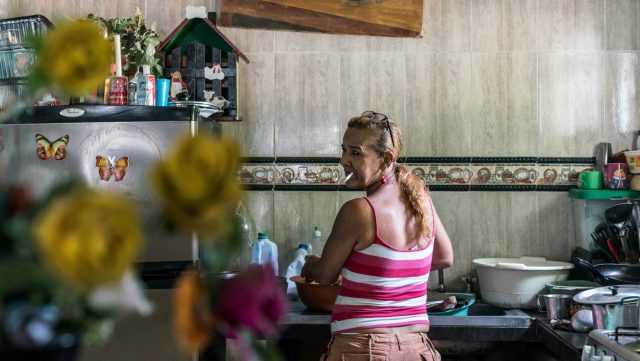Doris, who was raped with her sister in Colombia’s civil war, does the dishes in her home in Fundación. © NicholeSobecki/VII

Fundación is a village of secrets. Rural towns like this one were ground zero for the terror tactics of Colombia’s civil war, blocked from the outside first by the guerrilla fighters and then by the paramilitaries; some, like Fundación, were also places people fled to when home was even worse. This town is full of women whose bodies tell the story of conflict fought, mainly, by men. Some of their scars are obvious, still seared into skin. Others are psychic, invisible and below the surface.
Sofia’s are physical, a bullet hole over her left breast and a jagged line down her left arm from where surgeons had to cut open to repair the shattered bone. “There’s a saying here,” she says. “Small town, big hell.” Sofia (a pseudonym) is 42 and beautiful, slender with high cheekbones and almond eyes, square white teeth, and a kebab stick through a low bun of thick hair. A curly-haired toddler, her granddaughter, pads across a room that doubles as Sofia’s studio: she’s a self-taught seamstress, although it’s hard to sew with a hand that doesn’t fully close anymore.
Back in 2003, she was a teenage-mother-turned-sex-worker who had left small Fundación for a town on the Magdalena river in the state of Santander. She was kidnapped by a local paramilitary group and forced her to have sex with the leader, a man called Tiburón – “shark”. He was the one who shot her after she tried to run away on her third day of captivity. The man who had her kidnapped was a doctor, and he splinted her shattered arm. On the fifth day, he let her go.
She told no one about the rape, not even doctors at the hospital when she finally sought care weeks later. It was a motorcycle accident, she said; the clinic owner was friends with her brother, so he looked the other way.
Years later, a woman named Estella came knocking on Sofia’s door. Estella was helping sexual assault survivors connect with each other and seek recompence from the government; her program also offered contraception and sex education in a town where one residual effect of the trauma of war is astoundingly high rates of teen pregnancy and sexual violence. Sofia’s story began, slowly, to trickle out.
And then, in a country thousands of miles to the north, Donald Trump was elected president.

No single nation has as much influence on abortion rights and access for the world’s women as the USA, and no single nation has worked as diligently to prevent women outside its borders from being able to end their pregnancies. Anti-abortion activists have agitated against liberalisation in countries across Latin America, Africa, Europe, and Asia. The Trump administration made common cause with the authoritarian governments of Poland, Saudi Arabia, and others in restricting even open conversation about women’s reproductive needs on the international stage. And the long arm of US anti-abortion policy — which comes along with the alternate handing-out or grabbing-back of US money — continues to determine whether or not women who are not American citizens and may have never set foot on US territory can prevent pregnancy, decide whether or not to continue a pregnancy, or even find assistance if they’ve been raped.
That long arm has reached from hectic cities to far-flung villages to tiny towns, such as Fundación.
Trump effectively shuttered the Fundación program, along with hundreds of others across the globe, all combating sexual violence and funding family planning. Some may get back on their feet; many won’t. And even though he has left the White House, his legacy of anti-abortion alliances with some of the world’s worst human rights offenders remains.
The United States has been on a zig-zag path of extreme restrictions met, impotently, by occasional recalibration to a conservative status quo. Texas is only the most recent state to have functionally banned most abortions. The US Supreme Court has accepted a case that challenges Roe v. Wade, the 1973 decision that legalised abortion across the United States; the Court could flat-out overturn Roe, making abortion immediately illegal in several states, or it could keep the decision technically in place but gut it into an empty legal shell.
And even though a Democratic president has been in office since January, USAID money to the Fundación program has not been restored. And after the election in 2024, a shift in power would almost surely mean being defunded yet again.
This has left international healthcare workers spinning, and trying to keep up with the Americans and their whiplash-inducing policy changes.
Fundación is less than an hour’s drive from Aracataca, the childhood home of Colombia’s beloved native son Gabriel Garcia Marquez and the purported inspiration for the village at the center of One Hundred Years of Solitude. Estella, 54, guides our driver over the town’s bumpy roads as she makes calls on her pre-smartphone cell, tapping out the phone numbers with her carefully manicured nails. We arrive at the door of 65-year-old twins Doris and Francia, who live in a ramshackle house cluttered with old objects and well-loved collections, both women have the same dyed caramel-colored hair, both raspy-voiced and tired-eyed. Doris wears glasses and a pink-striped spaghetti-strap tank top; Francia totes a bald, big-eyed baby, one of her 21 grandchildren.
Both women have lived the story of Colombia’s brutal civil war, and both women know that their lives were forever changed by the whims of more-powerful men who decided, for reasons that remain mysterious to them, to target their town – and then to target Doris and Francia and many other women in it. That story lives in their flesh, and even two decades later, they carry its heavy memory.

In 2001, Colombia’s civil war was raging, and paramilitaries had captured Doris and Francia’s town and forced their business to shutter. Doris and Francia turned to picking bananas for money, hitching rides on the backs of cattle trucks to get home. One evening, both women were plucked from the side of the road and gang-raped by soldiers. They could never go back to picking bananas – they could barely leave the house. They saw friends, neighbours, and family members threatened and even murdered. They stayed silent.
That is, until they met Estella. Like nearly all of the women she works with, Estella is from somewhere else. She came here in 2002 when her family was displaced by the fighting, joining the many displaced families around Fundación who live in fear and poverty, and may never go back home. Estella encouraged the women she met to talk about their experiences, eventually forming an ad-hoc therapy group.
In 2016, Profamilia came to town. Colombia’s version of Planned Parenthood, it is the country’s largest provider of reproductive health services. In partnership with USAID, it conceived an ambitious outreach program to combat the high rates of unintended pregnancy and violence in Colombia’s rural reaches. Places with limited access to reproductive health care were targeted, as well as those with high rates of internally displaced people, extreme poverty, young people who were dropping out of school because of displacement, and adolescent pregnancy. One of these was Fundación.
“Some of these areas are where the biggest concentration of drug lands are,” says Marta Royo, the executive director of Profamilia. “So [USAID and Profamilia] were really focused on developing programs that could empower adolescents and give them an idea that there were other possibilities for a different future.”
They started with contraception, but quickly realised this didn’t capture the full scope of hardships rural Colombian women face. The high rate of teenage pregnancy in Fundación and many of the country’s other rural areas cannot be separated from the 50-year conflict that has made Colombia the nation with the highest number of internally displaced people on the planet, and second only to Syria in the number of forcibly displaced people generally (while most Syrians have left their country, 98% of displaced Colombians remain within their nation’s borders).
Violence against women was pervasive in the Colombian conflict, a tidal wave of trauma that rippled out for generations. In these same towns where families were ripped apart, women were raped, and people were forced to flee. There is now a generation of devastated people, uprooted, vulnerable, and trying to raise children and grandchildren in the shadow of a lingering catastrophe.
Profamilia met Estella and women like her to ensure they, their children, and grandchildren had access to contraception and sex education. But less than a year into the program, Trump’s election victory upset everything. In his first week in office, the new President used his powers to issue the Promoting Life in Global Health Assistance Act (PLGHA), an executive order opponents call the Global Gag Rule that cut off funding to any organisation that provided abortions with its own non-US funds, advocated for abortion rights, or referred women for safe, legal abortions. This was just the latest and most expansive iteration of a policy put into place by American president Ronald Reagan in 1985, and alternately rescinded by Democratic presidents and restored by Republican ones.
Profamilia’s funding was cut because the organisation provides safe abortions in accordance with Colombian law. The USAID-funded program was stopped a year early, having only spent half of its $2 million grant.

Colombia wasn’t the only nation hit hard. The PLGHA applied not just US family planning spending, but all US dollars spent abroad, including money spent on HIV/AIDS, malaria, and nutrition — some $12 billion in 2018. It applied even to organisations that didn’t receive US funds — if they accepted money from groups that did, they had to agree to be bound by the PLGHA limitations.
When organisations sued over previous versions of the rule and argued that it violated First Amendment free speech protections, their cases were dismissed because of lack of standing. The First Amendment doesn’t apply to foreign organisations or foreign nationals working overseas, and there’s no law saying the US government cannot attempt to restrict free speech abroad.
The Trump administration’s position on women’s rights and health extended far beyond abortion, and was more conservative than previous Republican administrations. In 2019, the US issued its annual human rights report, and had made some notable edits. Much of the information on reproductive health that had been standard in earlier versions was stripped out, including statistics about contraception access and maternal mortality. Had those figures been included, they would have indicated that there remains a significant unmet need for contraception, and that unsafe abortion is a leading cause of maternal death.
It is this erasing of the politically inconvenient and the enforced silence that most rankles. In Colombia, abortion is legal under several circumstances, including for rape survivors. How, Royo asks, could the US come in and say, “let’s talk about democracy, let’s talk about freedom of speech, let’s talk about respect of the law,” and then implement a rule that doesn’t allow health organisations to work according to the laws of their own country? “The message that as a country they’re sending is the opposite of believing in women’s equal rights.”
Other Western governments agreed. In response to the Trump cuts, and perhaps seeking to distinguish themselves from the Americans as exemplars of feminism and human rights, Canada, Europe and the UK rallied behind women’s health. The Netherlands set up the #SheDecides fund so donors could fill the $600 million shortfall created by US cuts, and began by donating 10 million euros. Norway announced it would give $10 million. Canada gave $20 million. Along with the Gates Foundation and UNFPA, the UK co-hosted an international family planning summit which raised $2.5 billion, including a five-year annual commitment of £45 million from the British government for services abroad.
Trump’s reactionary views on reproductive health pushed more progressive nations not just into the funding space, but into the discourse. To have countries like Sweden and Canada in the mix, Royo says, brought an explicitly feminist frame to the discussion, allowed solutions to be more expansive and creative, and gave health care providers more freedom to address the real problems in their country without tiptoeing around American abortion politics.
Shortly after he took office, Joe Biden undid Trump’s Gag Rule, restoring the US to a still-uneasy compromise of refusing to pay for legal abortion services, but at least funding pro-choice organisations for other services. The sweep of a pen, however, can’t build back dismantled infrastructure or immediately reestablish hard-earned trust. Pre-existing USAID contracts don’t just snap back; any NGO that was getting money now has to start from square one, identifying areas of need, drawing up plans, and jumping through American bureaucratic hoops for money that could very well be pulled four years from now.
Also, while his policies were devastating to reproductive healthcare access worldwide, Trumpism gave other nations something to publicly stand up against. Now that he’s out, and with Covid-19 wreaking havoc on economies, some countries are backing away from their Trump-era commitments. The UK is the most prominent: it announced a reduction in its foreign aid commitments from 0.7 percent of its gross national income to 0.5 percent, which creates a gap of more than £4 billion. Although the government has not yet said exactly where all the cuts will be made, women’s health organisations say they seem to be first on the chopping block: UNFPA, the UN’s primary family planning arm, said their UK funding had been slashed by 85%. Just a year ago, the FCDO promised UNFPA a whopping £425 million through 2025. Now, they’re reneging on that commitment.
In Colombia, money comes and goes as the rules change, but the need doesn’t dwindle – especially for the country’s many rape survivors.
“Here in Colombia, rape is like, how can I put it – it’s part of the essence, it’s taken totally for granted,” Royo says. “Women and girls are raped and no one says anything. Part of the counseling we provide, it starts with recognising, no, that is not normal.” This is part of Royo’s frustration with the US funding fluctuations: much-needed money is conditioned on reinforcing broad stigma and silence on the sensitive topic of abortion. That feels uncomfortably akin to how women who are raped here are coerced and sometimes forced into shame and silence.
You hear this in the stories Estella’s women tell. Most are like Sofia’s and Doris’s and Francia’s: there is a rape, there follows years of secrecy, maybe there is an attempt to report, to make real what was for so long hidden, and then there is nothing – layers of secrecy and silence, a covering of ears even when women try to speak. In 2013, Estella told Sofia that the Colombian government was documenting the many war crimes and offering compensation to victims. Sofia was scared – “It was the paramilitaries. They had a lot of power. They still do” – but filed the report anyway.
That was years ago, and compensation still hasn’t materialised. “I haven’t even gotten a potato,” she says.
Still, Estella was proud of her. And after being so quiet for so long, it felt good to speak.
This article forms part of a project by Jill Filipovic and Nichole Sobecki: Abortion Access in Crisis and Conflict Zones










Join the discussion
Join like minded readers that support our journalism by becoming a paid subscriber
To join the discussion in the comments, become a paid subscriber.
Join like minded readers that support our journalism, read unlimited articles and enjoy other subscriber-only benefits.
Subscribe